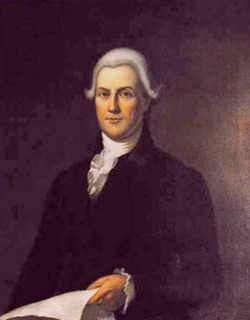Putnam himself set off toward Boston on horseback with his local militia regiment, becoming part of what was later called the “Powder Alarm.” Meanwhile, his dispatches made their way across the colony.
The Middletown lawyer Titus Hosmer (1736-1780, shown here) left a detailed and dramatic account of the response along the Connecticut River south of Hartford in a letter to Silas Deane, apparently written on Sunday, 4 September:
This morning quite early I was call’d out of my bed by the Sheriff: “Where’s the Town Stock?”The upper-class, educated, well-connected Hosmer was being pushed along by his yeoman neighbors. The society held him in enough high esteem to give him the responsibility of storing “Ball and Flints,” but he felt he had to defer to their fervor to add gunpowder and roll cartridges. Then the lack of confirmation from the usual official news carrier made people wonder if the original rumor was correct.
I honestly own’d there was not a pound of powder in my keeping; as for Ball and Flints they need not fear; but for Heaven’s sake, says I, what means this? Is Boston in action?
“O yes, terrible News; I suppose before this Boston is in ashes.”
My God! is it possible! But after a little more spit,—he show’d me a letter from Putnam; (by this time the people gathered from all quarters like a snowball;) the contents—was something—but, to puzzle any one, sufficient. The purport was, Boston was in action by the “troops sending out to seize all the powder in the country, especially at Framingham [sic] about 20 miles from Boston; which when discovered occasion’d the country people to collect and offer to rescue the powder. Six of the country people were shot dead at the very time, and many wounded—an Artillery planted at the Neck—the Ships were heard to fire all night of a Friday.”
Observe, this came from Windham by a Farmington man that was late from Boston. We expected Expresses every hour. Previous to this collection at yours and my house, which was a large collection from all parts of the parish, Mr. Sheriff had sent Loomis off for Mid[dletow]n.
Much was said; some were for pushing on to aid ’em at once; so much was said, I was obliged to send to Mr. Alsop a Wagon for powder, which he was good enough to let me have, and at this time it was friendly to me—for you are very sensible right or wrong we are obliged in some measure to follow the cry of the many.
A number went to Hartford for further intelligence. By this time a number were up from Rockyhill, but agreed to wait a little longer as further News seemed very requisite. At nine all dispers’d to their several homes, but every one very anxious, you may easily judge.
At 12 o’clock news from Hartford was nearly thus: ”Benjn. [sic] Brattle at Cambridge, a high tory, had petitioned [Gen. Thomas] Gage for troops to protect him at his house, which Gage granted; a mob gathered and demand of Brattle to renounce his toryism or whatever you may term it; but after a short parley the troop fired, kill’d some right out, a large numr. wounded. No news from the town itself.”
This, with many circumstances, leave us quite in the land of amaze—for the improbability that this should happen on Friday, and an Express follow on to overtake Hyde just before he came into Hartford, and Hyde not able to go any further, makes the whole a matter of doubt—but the town is in great ferment; some of this opinion, some of that, as various as the wind: but, as I observ’d before, all wear a dejected countenance, but resolved, if required, to pursue on. It’s said the Eastern people are already gone on arm’d—some from Farmington, and elsewhere. Great Heaven, where will these unhappy, truly melancholy affairs end!
By the time the people of central Connecticut were having those conversations, Putnam had discovered that the rumor wasn’t correct. The royal army hadn’t fired on anyone. The navy hadn’t laid Boston in ashes. He turned around and led his men back to their farms.
But the alarm continued to ripple south through the colonies. Peter Force’s American Archives quotes a letter from New York describing Putnam’s news arriving there on 5 September. “Colonel Putnam, upon this advice, alarmed the whole country, and requiring them to arm themselves and take the road to Boston, which they actually did, insomuch that the Post says that the roads were covered with people.” But more accurate news followed.
Nonetheless, New England was soon on a war footing. I focused The Road to Concord on events in Massachusetts, but Connecticut, with its elected governor, had more freedom for official action. In October, the colonial assembly commissioned Putnam lieutenant-colonel of a regiment drawn from Windham County. People even began to speak of him as a potential general of a resistance army.

As you know, John, the inaccurate news of the Powder Alarm reached Philadelphia as the Continental Congress was first meeting. Here is John Adams, writing to Abigail, on September 8:
ReplyDelete"We have received a confused Account from Boston, of a dreadfull Catastrophy. The Particulars, We have not heard. We are waiting with the Utmost Anxiety and Impatience, for further Intelligence.... Every Gentleman seems to consider the Bombardment of Boston, as the Bombardment, of the Capital of his own Province."
[http://www.masshist.org/digitaladams/archive/doc?id=L17740908ja]
Of course, the correct news arrived there later, as well.